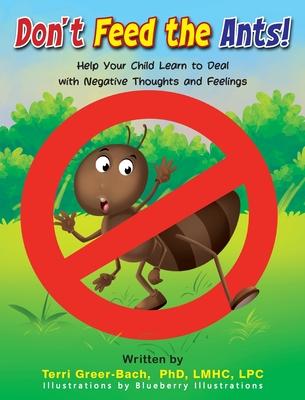Don't Feed The Ants is a children's book, ages 5 to 10, to help children identify, stop, and change automatic negative thoughts by using a process called "thought-stopping". This book depicts a little boy who feels sad, has negative thoughts about himself, and may have depression. He does not want to join his friends in soccer. An analogy of ANTs (Automatic Negative Thoughts) and the insects "ANTs" is used in describing how ANTs multiply if we "feed" them. The little boy's mother talks with her son about his sadness and how to change the negative thoughts to positive thoughts, instead of "feeding" the ANTs, causing them to multiply. Instead, she teaches him how to catch, stop, and change the automatic negative thoughts to positive thoughts, so he can control the negative thoughts and/or depressive thoughts, and feel happy again. It is important that we teach our children these coping mechanisms early in life, so they can learn to identify and manage their emotions, thereby increasing their resilience in life. If children allow these automatic negative thoughts to control them, they may end up being negative and depressed adults. Any techniques we can teach our children will only benefit them as they grow into teens and then adults.

Don't Feed The Ants is a children's book, ages 5 to 10, to help children identify, stop, and change automatic negative thoughts by using a process called "thought-stopping". This book depicts a little boy who feels sad, has negative thoughts about himself, and may have depression. He does not want to join his friends in soccer. An analogy of ANTs (Automatic Negative Thoughts) and the insects "ANTs" is used in describing how ANTs multiply if we "feed" them. The little boy's mother talks with her son about his sadness and how to change the negative thoughts to positive thoughts, instead of "feeding" the ANTs, causing them to multiply. Instead, she teaches him how to catch, stop, and change the automatic negative thoughts to positive thoughts, so he can control the negative thoughts and/or depressive thoughts, and feel happy again. It is important that we teach our children these coping mechanisms early in life, so they can learn to identify and manage their emotions, thereby increasing their resilience in life. If children allow these automatic negative thoughts to control them, they may end up being negative and depressed adults. Any techniques we can teach our children will only benefit them as they grow into teens and then adults.